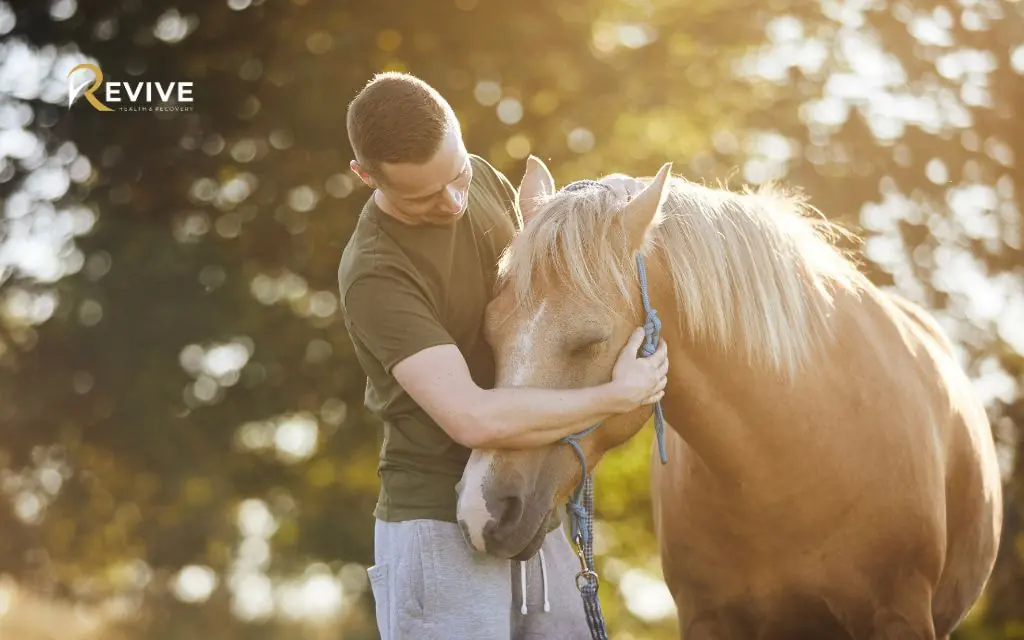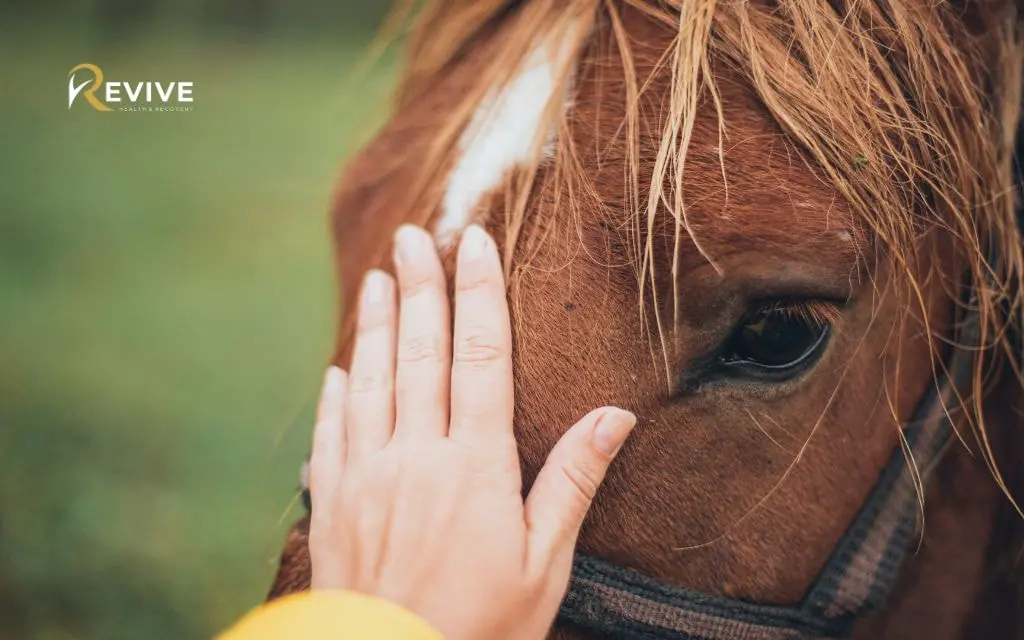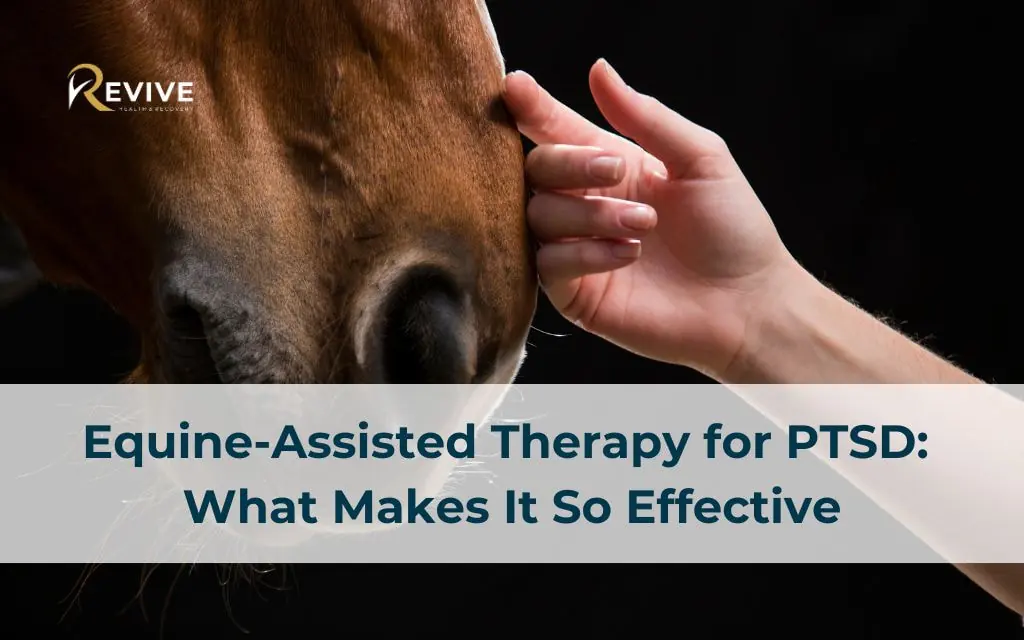For those seeking to overcome past pain, equine-assisted therapy for PTSD offers a unique and increasingly popular path to healing-one that harnesses the remarkable sensitivity and strength of horses. Far more than just animals, horses have an extraordinary ability to mirror human emotions, fostering a deep connection that can aid in recovery from post-traumatic stress disorder (PTSD), a condition that often demands long-term, trauma-informed care.
In Denver, Colorado, this alternative therapy is gaining traction among veterans, trauma survivors, and individuals seeking non-traditional approaches to wellness. At Revive Health Recovery, we recognize the value of such innovative healing paths and are dedicated to guiding clients toward the most suitable PTSD care options available locally, including equine-assisted therapy.
What Is Equine-Assisted Therapy for PTSD?
Equine-assisted therapy (EAT) represents a specialized form of animal-assisted intervention that incorporates structured interactions with horses to facilitate healing from post-traumatic stress disorder (PTSD). This approach differs from casual horseback riding, as it operates within a therapeutic framework designed to address specific psychological needs.
EAT typically includes several components:
- Groundwork: Participants learn to lead and direct horses through various exercises, helping build confidence and communication skills.
- Grooming: The rhythmic actions of brushing and caring for horses create calming sensory experiences that help regulate the nervous system.
- Therapeutic Riding: Mounted activities that improve physical awareness, coordination, and provide embodied experiences of trust and control.

These sessions occur under the guidance of certified equine specialists and mental health professionals who create a safe environment for processing trauma responses. If you’re wondering how to start horse therapy for PTSD, this structured approach offers a clear pathway forward.
How Does Horse Therapy Help with PTSD?
Horse therapy offers unique benefits for PTSD recovery through several key mechanisms. According to Dr. Sandra B. Barker, a pioneer in human-animal interaction research, the horse-human bond activates neurobiological pathways that support trauma processing and emotional regulation.
Horses possess an exceptional capacity to mirror human emotions and react instantaneously to subtle shifts in mood or intention. This immediate, honest feedback helps individuals with PTSD:
- Develop emotional regulation skills through non-verbal communication
- Reduce hypervigilance by experiencing safety in the present moment
- Manage anxiety through co-regulation with the horse’s calm presence
- Rebuild trust through transparent interactions with these sensitive animals
The horse’s heightened sensitivity to surroundings creates natural opportunities for individuals to practice grounding techniques and mindfulness. When a person with PTSD experiences anxiety, the horse responds immediately—creating a real-time biofeedback system that helps clients recognize and address their emotional states more effectively than in traditional talk therapy settings. This horse-human bond in therapy forms the foundation of its effectiveness.
Benefits of Equine-Assisted Therapy for PTSD
Research supported by organizations like PATH International (Professional Association of Therapeutic Horsemanship) demonstrates significant improvements for PTSD patients who participate in equine therapy programs. These benefits of horse therapy for PTSD include:
- Reduced Symptom Severity: Participants often report decreased frequency and intensity of flashbacks, nightmares, and intrusive memories.
- Improved Emotional Functioning: Horse therapy helps reduce depression and anxiety while increasing capacity for joy and connection.
- Enhanced Self-Regulation: Working with horses teaches individuals to modulate their nervous system responses and develop greater emotional resilience.
- Restored Social Connection: The bond formed with horses often transfers to improved human relationships and reduced isolation.
Unlike conventional talk therapies, equine-assisted therapy engages the body directly in the healing process. This nature-based interventions for mental health allows trauma processing through somatic experiences—addressing the physiological aspects of PTSD that often remain stored in the body despite cognitive understanding of the traumatic events.
Horse Therapy Options in Denver, Colorado
Denver and its surrounding areas offer several established equine therapy programs specifically designed for individuals with PTSD. Finding horse therapy for PTSD in Denver has become increasingly accessible with these options:
Warrior Ranch provides specialized programs for veterans struggling with combat-related trauma. Their structured eight-week programs focus on building resilience through horse-human partnerships.
Colorado Therapeutic Riding Center offers PTSD-specific interventions with PATH-certified instructors and therapists trained in trauma-informed care.
Temple Grandin Equine Center provides evidence-based equine-assisted activities with a strong focus on neurobiological aspects of trauma recovery.
Several of these facilities offer specialized tracks for different populations, including veterans, first responders, survivors of abuse, and individuals with complex developmental trauma. Most programs accommodate both individual and group therapy formats, including therapeutic riding for veterans.
Cost of Horse Therapy for PTSD in Denver
The financial investment for equine therapy in Denver varies based on several factors. Understanding the cost of horse therapy for PTSD in Denver helps individuals make informed decisions:
- Program Structure: Individual sessions typically range from $100-175 per hour, while group programs may cost $75-125 per session.
- Frequency and Duration: Most therapeutic protocols recommend weekly sessions for 8-12 weeks, though many participants continue longer for maximum benefit.
- Facility Type: Non-profit organizations often offer lower rates than private practices, with some providing sliding scale options.
Many Denver-area equine therapy centers recognize financial barriers and offer assistance through:
- VA approval for veteran programs
- Grant funding through mental health organizations
- Sliding scale payment systems
- Scholarship opportunities
- Insurance billing options (with some limitations)
For those concerned about costs, programs like Warrior Ranch partner with veteran service organizations to cover expenses for qualified participants.
How to Start Horse Therapy for PTSD
Beginning equine-assisted therapy requires a thoughtful approach to ensure you find the right fit for your needs:
- Identify Your Goals: Consider specific aspects of PTSD you want to address—whether emotional regulation, trauma processing, or social connection.
- Research Certified Programs: Look for facilities with PATH International accreditation and therapists with trauma-specific training.
- Schedule an Initial Assessment: Most centers begin with an intake evaluation to understand your history, triggers, and therapeutic goals.
- Begin Structured Sessions: Work with a treatment team that typically includes a mental health professional and a certified equine specialist.
- Commit to the Process: Equine therapy, like all trauma treatments, requires consistency and patience.

If you’re exploring PTSD treatment options in Denver and need guidance on whether equine therapy fits your needs, contact Revive Health Recovery for consultation. We can help assess your situation and connect you with appropriate resources, whether that includes horse therapy or other evidence-based approaches.
Scientific Support for Equine-Assisted Therapy
Research on equine-assisted therapy for PTSD continues to expand, with promising results from multiple studies. Dr. Sandra B. Barker’s research highlights how human-animal interactions activate oxytocin release and reduce cortisol levels—directly addressing the neurobiological dysregulation common in PTSD.
Recent studies document:
- Decreased PCL-5 scores (a standard PTSD symptom measurement) after 8-week equine programs
- Improved heart rate variability during and after horse interactions
- Enhanced emotional regulation capacity that persists beyond the treatment period
- Greater effectiveness for certain populations who struggled with traditional talk therapies
While equine therapy shows excellent results as a standalone intervention, integration with cognitive-behavioral therapy, mindfulness practices, and group therapy often creates comprehensive treatment plans with lasting impacts. Reviews of horse therapy for PTSD consistently affirm its value alongside traditional approaches.
Why the Horse-Human Bond Matters in Therapy
The therapeutic relationship between horses and humans provides unique healing opportunities for several reasons. Understanding how does horse therapy help with PTSD requires recognizing these special qualities:
- Prey Animal Perspective: Horses, as prey animals, remain constantly vigilant—mirroring the hypervigilance experienced by those with PTSD. This creates immediate recognition and normalization of trauma responses.
- Authentic Feedback: Horses respond honestly to human emotional states without judgment or agenda. This transparency builds trust that often transfers to human relationships.
- Non-Verbal Communication: For trauma survivors who struggle to verbalize experiences, horses offer communication pathways that don’t require words.
- Physical Co-Regulation: The horse’s consistent breathing patterns and heartbeat provide physiological anchoring that helps regulate dysregulated nervous systems.
This form of therapy proves particularly valuable for individuals who find traditional talk therapy challenging or insufficient, including veterans, first responders, and survivors of complex trauma.
When Equine Therapy May Not Be Enough (and What to Do Next)
While equine-assisted therapy benefits many individuals with PTSD, comprehensive recovery often requires a multi-modal approach. Some considerations include:
- Severe symptoms may require medication management alongside experiential therapies
- Complex trauma histories may need additional specialized approaches
- Physical limitations might necessitate adaptations or alternative treatments
- Some individuals simply don’t connect with horses or outdoor settings
Revive Health Recovery offers several evidence-based PTSD treatment options that complement or serve as alternatives to equine therapy:
- Intensive Outpatient Programs designed specifically for trauma recovery
- Trauma-focused Cognitive Behavioral Therapy
- EMDR (Eye Movement Desensitization and Reprocessing)
- Group therapy with fellow trauma survivors
- Somatic experiencing therapy
For many clients, the most effective approach combines multiple modalities tailored to individual needs and preferences. If you’re uncertain about the best path forward, we encourage you to contact our team for a personalized assessment.

FAQs
Is equine-assisted therapy safe for people with PTSD?
Yes, it’s conducted in a structured, supportive environment with licensed professionals and trained horses specifically selected for therapy work. Safety protocols address both physical and emotional concerns.
What should I wear or prepare for a horse therapy session?
Wear closed-toed shoes and comfortable clothes suitable for outdoor activity. All equipment and safety training will be provided. No prior horse experience is necessary.
How often should I attend equine therapy sessions?
Most programs recommend weekly sessions for optimal results. Your treatment team will develop a personalized plan based on your specific needs and circumstances.
Can veterans use VA benefits to cover horse therapy?
Some Denver-area programs maintain VA approval or partner with nonprofits specifically to serve veterans. Contact individual providers to verify eligibility and coverage options.
What if I want PTSD treatment but am unsure about horse therapy?
Revive Health Recovery offers several evidence-based PTSD treatment options beyond animal-assisted therapy. Reach out for a personalized assessment to identify the approaches best suited to your needs.
Conclusion
Equine-assisted therapy offers a powerful pathway to healing for many individuals battling PTSD in Denver. The unique connection between humans and horses creates opportunities for emotional processing that traditional therapies sometimes cannot achieve alone.
Through the silent wisdom of these majestic animals, many trauma survivors discover renewed capacity for trust, emotional regulation, and authentic connection. The physiological benefits – reduced cortisol, improved heart rate variability, and nervous system regulation – complement the psychological progress made during sessions.
For those who haven’t found complete relief through conventional approaches, equine therapy represents a valuable addition to the recovery journey. The Denver area’s natural beauty and established therapeutic riding centers create ideal conditions for this healing work.
Whether you’re considering horse therapy or exploring other Colorado PTSD Healing Programs, remember that recovery often involves finding the right combination of approaches for your unique situation. Contact Revive Health Recovery to discuss how we can support your healing journey with trauma-informed care that addresses your specific needs and preferences.



